KAK vs Yumi Stynes race row: Aborigines want their broken communities fixed
Kerri-Anne Kennerley is a name with vague recognition. Yumi Stynes draws a complete blank. This is what the residents of two remote indigenous communities have more interest in.
National
Don't miss out on the headlines from National. Followed categories will be added to My News.
What happens on midmorning weekday television out of Sydney is not usually of concern to the people of Minyerri, a remote community 480km southeast of Darwin.
Kerri-Anne Kennerley is a name with vague recognition. Yumi Stynes draws a complete blank.
Michelle Bennett, 51, a senior Aboriginal teacher at Minyerri school, did not see them going head-to-head in an argument over what mattered more: changing the date of Australia Day or addressing issues of child abuse and atrocious conditions in our nation’s backyard.
But she already knows the answer. It’s her life.
Minyerri knows about living rough. Two years ago, it made national headlines with people, including kids, living in squalor in tents and makeshift bough sheds by the community billabong.
Since then, governments, both NT and federal, have been embarrassed into action and 10 new houses are either completed or nearly there.
There is still chronic overcrowding — which creates the perfect environment for child abuse — but the community is picking itself up.
“Everyone’s arguing about changing the date,” says Michelle.
JACINTA PRICE: Yumi is wrong about Kerri-Anne
OPINION: Of course what KAK said was racist
MORE: Jacinta Price taunted with vile abuse as she backs KAK
WARREN MUNDINE: KAK praise for talking about indigenous issues
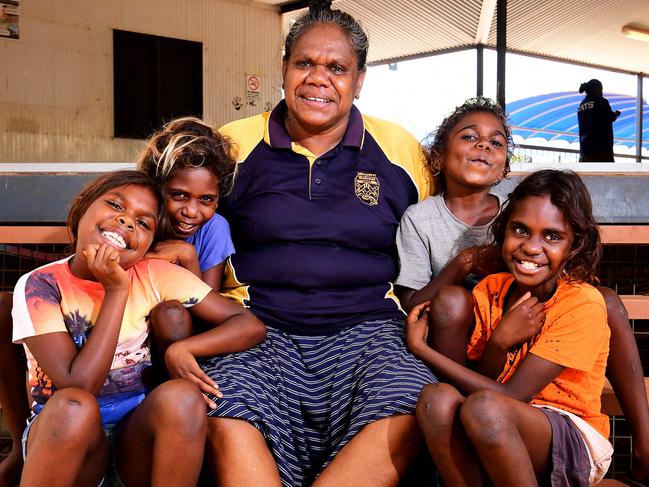
“I’ve got nothing against people from urban areas, but what happened in the past happened. We had massacres, we had a lot of bad things.
“I can see where Kerri-Anne Kennerley is coming from. Kerri’s saying it’s important to focus on kids being neglected and abused. Of course it’s the most important issue.”
And changing the date? “It’s not something we talk about. The date is the date. Let it be.”
The rape of a two-year-old girl further south in Tennant Creek last year is known to every Aboriginal person in the north, whether they follow media or not.
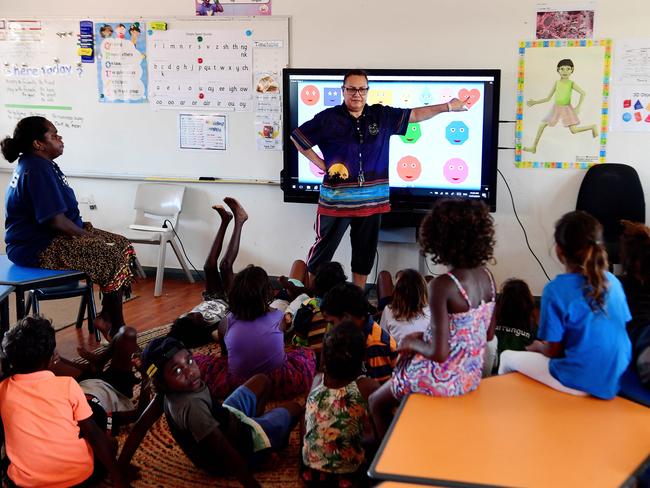
EXTREME MEDICS:
Untold stories of Alice Springs’s fearless paramedics
Woman’s horrific injuries not caused by hit and run
10 shocks: Medics’ chilling battle to save a man’s life
The child had to be treated for gonorrhoea after the assault in a house where welfare authorities knew the children were at risk.
“It hurts,” says Michelle. When you hear about it, you wonder why that happens. It saddens me to hear about our people doing that to our kids, our bubs. What trauma will that kid go through?
“Who knows how underreported it is? You hear about it in surrounding communities. It’s sad. If you’re an adult, it’s your responsibility to look after kids. I’ve protected mine like a lioness. That’s who I am.”
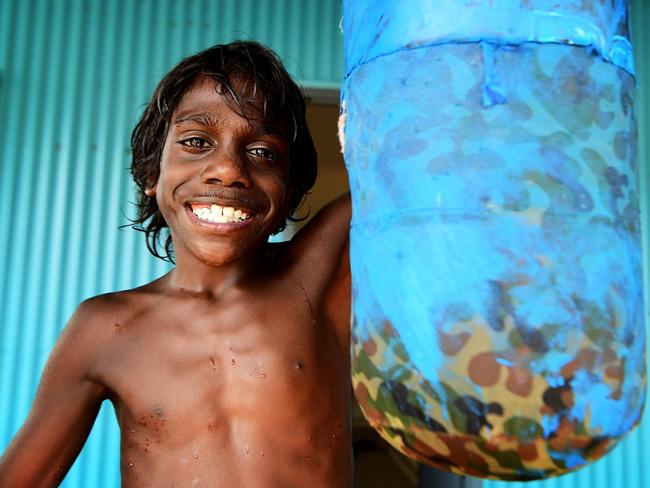
Kennerley was called a “racist” by Stynes. Michelle’s experience is slightly different. Growing up indigenous, she’s been called racist things.
“It doesn’t matter to me,” she says. “I’m not going to change.”
What they want to change is their health. Darren Farrell, Minyerri traditional owner and reverend, says the outlook is bleak. “We have biggest mob health problems,” he says. “Too much. Diabetes, heart problems, cancer. Some people, if they get from the flu, they stay sick.”
This man, of the Alawa tribe, is asked about Australia Day. He shrugs. “We want a good, happy healthy environment for our kids.”
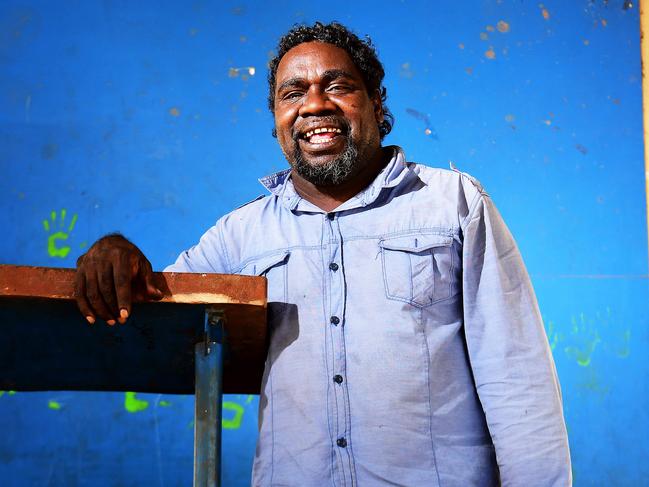
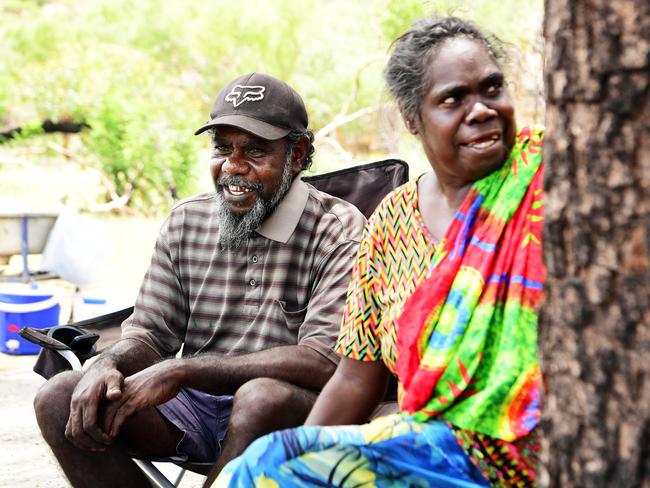
It is a curious First World indulgence to have a venomous argument about changing a date, while people among us live in Third World conditions.
We met Carole Farrell, 47, and her husband, Darrell O’Keefe, 43. They do not watch TV, don’t read papers, do the internet or any of it. They have never heard of Kennerley and need the thrust of the argument translated.
Currently, they are living in a lean-to while waiting for a house to be built. This is partly by choice. The locals have been offered temporary accommodation in clammy demountable boxes and this couple prefers to live on the outskirts of Minyerri, cooking damper on the outside fire.
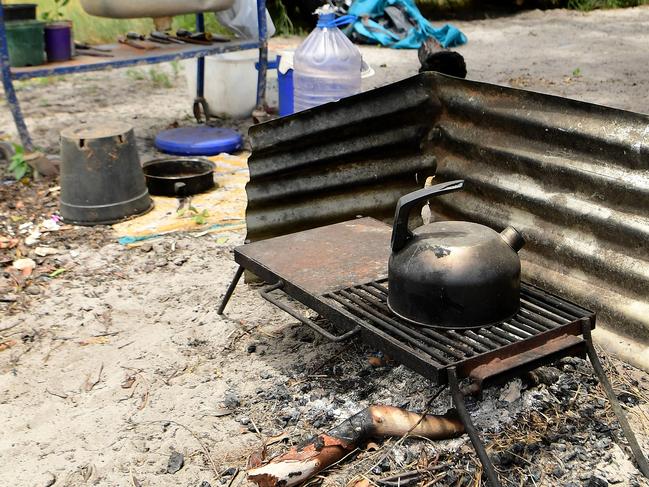
They rake the sand outside their humpy and “borrow” electricity to run a fan and fridge. They don’t have a car.
“Car?” says Darrell. “We got family.”
Australia Day? They know nothing about. They don’t need to. There’s nothing more Australian than them. “Children,” says Darrell, “are the most important thing.”
Minyerri is looking better than it did two years ago. The school on Thursday this week was running at 80 per cent attendance — a near record, but it’s early in the school year and it will soon drop off, possibly to as low as 50 per cent.
It’s a busy and invigorated community, trying hard. But then we head north to Beswick.
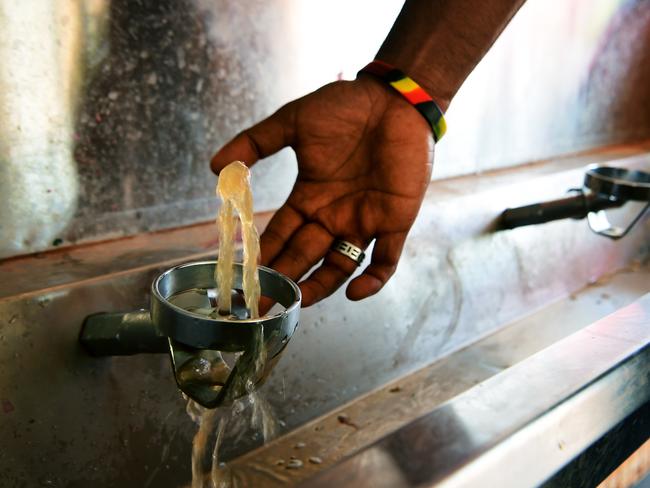
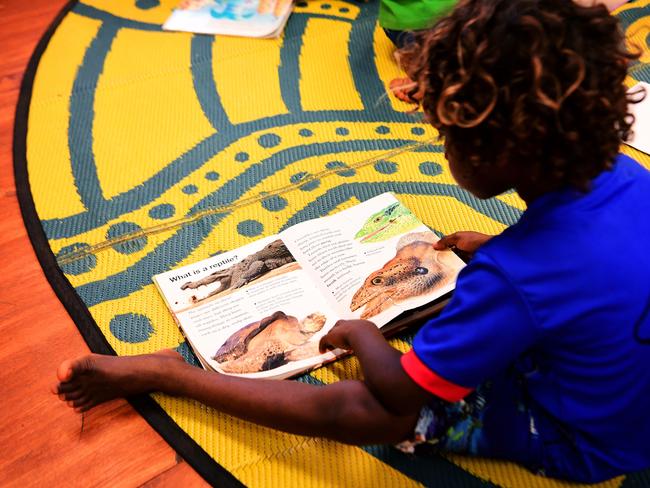
A COMMUNITY TORN APART
ON THE ROAD to Beswick, we are following what looks like a refrigerated meat delivery van. But this vehicle’s not delivering; it’s collecting.
The police have got vehicles blocking the road. A green Ford Fairmont has left the road and rolled end-over-end. An indigenous man is deceased in the vehicle. He’s the third from this area to die on NT roads in 10 days.
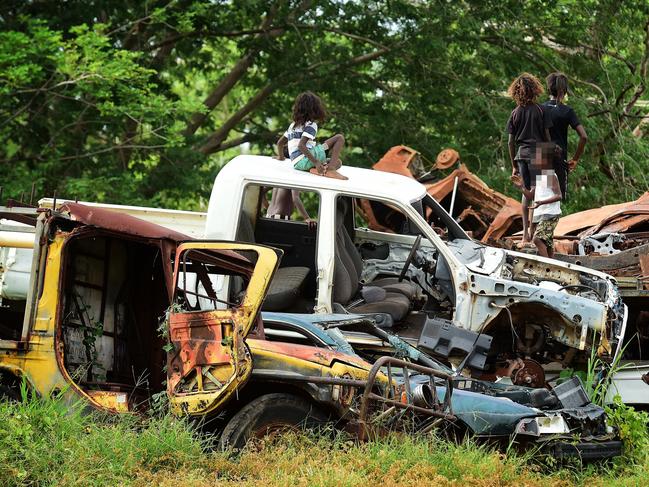
Jail, road trauma and alcohol-related bad health have ripped the young and middle-aged men from these communities. Nothing can be normal in these townships when so many are dead or missing.
The police point out something curious. Hidden in a culvert, just near the destroyed vehicle, is a bottle of vodka. It is suspected one of the passengers had the wherewithal, even as a friend lay dead at the wheel, to stash the liquor for later.
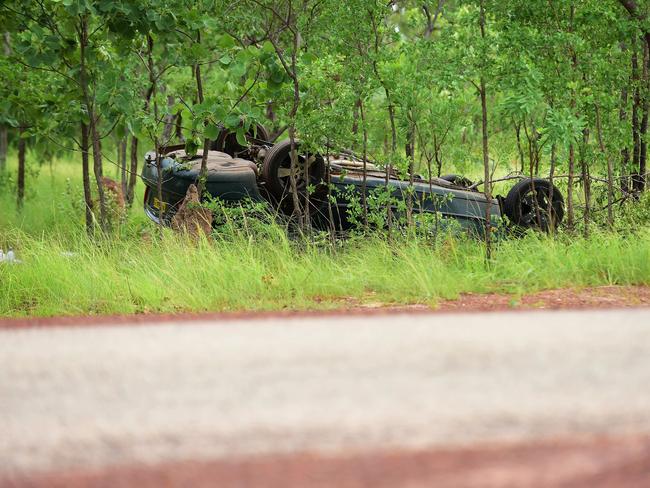
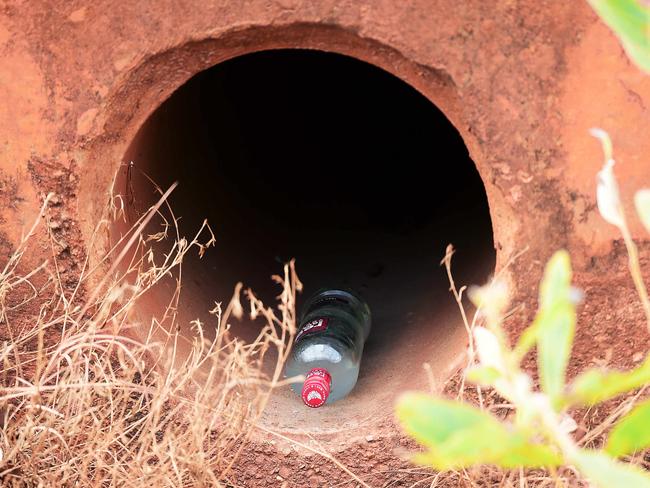
Further up the road, the community of Beswick is a picture of ruin and despair.
Two quick points. Having covered this story for decades, there’s a little bit of chagrin in following in the footsteps of Kerri-Anne Kennerley. But more than that, this community is at this time as bad as I’ve ever seen, anywhere, ever.
It’s partly because the relatively new housing development at the south of town is now close to a total slum. When new things are wrecked, it always looks worse.
Doors ripped from hinges, ground-in filth on the walls, dead cars that have had their windows post-mortem flogged like they’re being punished, heaps of wandering kids, dogs with tick infestations so grotesque that it is nothing less than cruel.
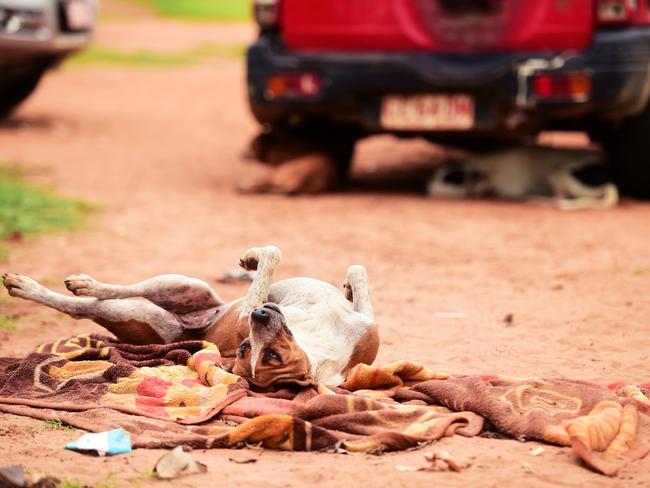
There’s plenty of official-looking vehicles driving around. How can they not see what is before their faces? How can the locals live like this? It’s their decision not to clean, it’s their decision whether or not to destroy their homes.
If the dogs are neglected, what about the kids? Being young, brilliant and fearless, they backflip off standing starts and demonstrate uncanny prowess with balls. But we already know that. What we don’t know is how they are suffering.
What happens behind the front doors in homes like the ones in Beswick, just 420km from Darwin? That is, if they have front doors.
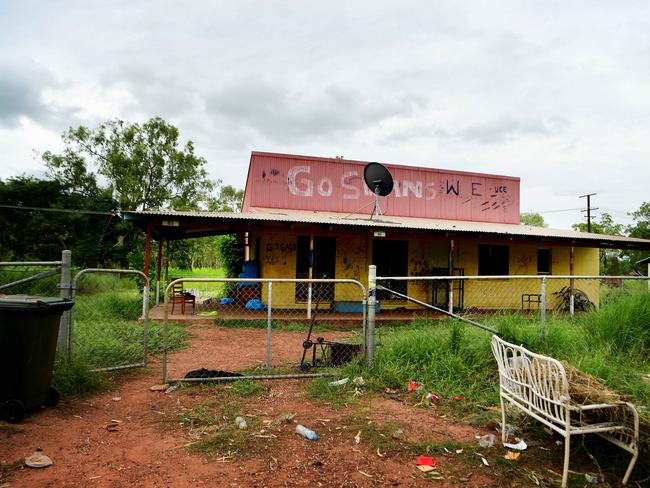
There are food programs at school, and these kids tend to get ravenous midmorning because they don’t get breakfast. It’s a daily triage routine that cannot mask what we’re really looking at: the most vulnerable kids in Australia.
As we head out of Beswick, the body’s been taken away in the mortuary vehicle and the cops are finalising their investigation.
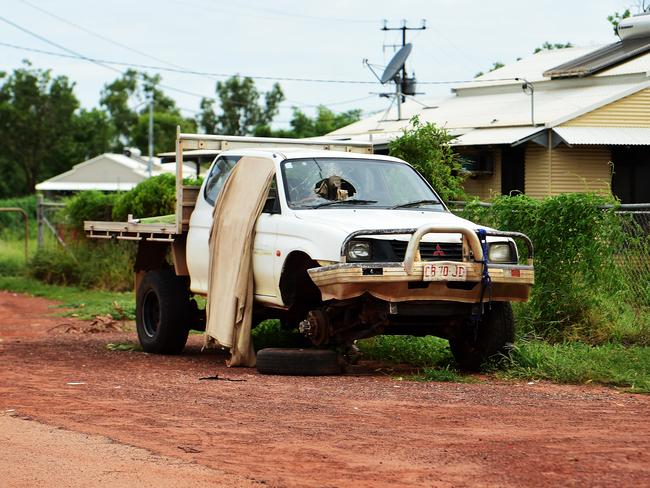
Chatting to one of the officers about Beswick, he agrees it’s as bad as he’s seen it. Yet, he says, the community of Barunga, just 30km away, is spotless and they’re not seeing major problems.
“They’re the same people, the same families. How can one be so bad and the other so good?” He doesn’t understand it, nor do I. But it is something to do with strong people taking charge in Barunga, while no one is doing the same in Beswick.
Were Yumi Stynes to spend one night in one of the hovels of south-side Beswick, or even to just do a drive-by from an airconditioned vehicle, her views on the national priorities would be shaken.
Originally published as KAK vs Yumi Stynes race row: Aborigines want their broken communities fixed


